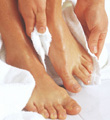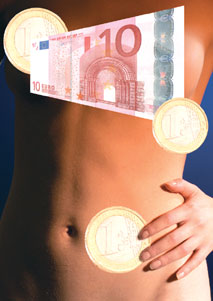

Organ
of the
GD — Society for Dermopharmacy
 |
Issue 2 (2004) |
Dermopharmacy News
International Conference on Pharmaco-economics and Research of Quality of Life, Hamburg, October 2004
Cost-Benefit Analyses of Dermatics Increasingly Important
Report by Thomas Müller-Bohn, Süsel
More than 1,000 participants from Europe and overseas took part in a varied programme reflecting the manifold facets of pharmaco-economics at 7th European Conference of the International Society for Pharmaco-economics and Outcomes Research (ISPOR) in Hamburg between 24 and 26 October 2004.Apart from the permanent topic „Vierte Hürde” (fourth hurdle) regarding the refund ability of drugs, methodical questions concerning evaluation techniques of pharmaco-economics and the research on quality of life were dealt with and numerous results of pharmaco-economic studies – also from the field of dermatology – have been introduced. A presentation concerning the quality of life at psoriasis has won the prize for the best poster presented.
Numerous workshops and presentation serials offered a forum otherwise in Germany not existent for the representation and discussion of scientific individual aspects in the field of pharmaco-economics. In doing so, the variety of methods became just as obvious as the large number of drugs examined from the most different fields of indication. In the course of the plenar meetings, however, politically relevant issues were of primary interest.
Georg Baum, head of the directorate in the Bundesministerium für Gesundheit und Soziale Sicherung (BMGS) (Federal Ministry for Health and Social Safety) confirmed the great expectations by the Federal Government towards the implementation of disease-management-programmes (DMP). These are considered to be an effective instrument to prevent excessive, insufficient and inadequate supply and save costs at the same time. In contrast, Prof. Dr. Peter Zweifel, Zurich, recommended to always question which participants at DMP pursue which interests. Referring to the German DMP he complained about the lacking objectives. Moreover, the offered compensation is insufficient, according to Zweifel, to convince a sufficiently large number of patients for the programmes.
 Measures for prevention and treatment of skin diseases are increasingly associated with cost aspects. Some new insights relating to the cost-benefit relationship of dermatological therapy methods have been explained on the occasion of 7th European Conference of the International Society for Pharmaco-economics and Outcomes Research (ISPOR) in Hamburg in October 2004. |
National and International
Benefit-Assessment
The so-called „Vierte Hürde” (fourth hurdle) for the refund ability of drugs exists in several European countries, for example in the Netherlands, Sweden, Finland, Portugal and the Baltic countries, it is however, performed in a very different way. The National Institute for Clinical Excellence (NICE) responsible for England and Wales is in many cases considered to be exemplary for the technical work. There is no mandatory limit for the cost efficiency; however drugs for which an additional quality-adjusted year of life amounts to over 30,000 pounds are only accepted in few cases.
Considerations concerning the functioning of the Institut für Qualität und Wirtschaftlichkeit in der Medizin (Institute for Quality and Cost Effectiveness in Medicine) only established recently in Germany, have also been closely observed by foreign participants. As far as these reflections have been known on the occasion of the ISPOR conference, the new institute is to orient itself to a minor extent on economic aspects but to a major extent on the therapeutical outcome of the drugs. Accordingly, a pharmaco-economics founded “Vierte Hürde” (fourth hurdle) will neither come into being with this institute in Germany.
Nevertheless, according to explanations given by professor Dr. Reiner Leidl, Munich, the institute will prepare the decisions of the Gemeinsame Bundesausschuss (Mutual Federal Committee) on whether drugs are considered to be innovative and thus free-in-pricing or whether they are subject to the fixed pricing system. For the manufacturers concerned this fact is of considerable economic consequences, however the costs for additional pharmaco-economic dossiers will be probably spared for industry, according to an assessment by Dr. York Zöllner, Hannover.
Reduced Quality of
Life by Sunburn
Only a comparably small part of the pharmaco-economic work introduced concerned Dermatology. However, a series of individual presentations, presented by Karin Berger, Munich, dealt with issues from this field. In this context, P. Guitera, Paris, reported about a study concerning sun protection in the frame of which dermatologists equally pursued the proven way within the GD of establishing cooperations with pharmacies. They had questionnaires distributed to customers on site who bought sun protection preparations.
It turned out as a result that men contact sunburn significantly more often, perform less sun protection and are less informed about the hazards of sun exposition. The impairment of the quality of life by sunburn has been measured with the Dermatology Life Quality Index (DLQI) and is comparable with the burden of acne patients. A second study is planned for the coming year when it will be checked whether probands change their behaviour of sunbathing.
Depressions caused
by Dermatoses
The same referee presented a study by J. Lambert and colleagues, Brussels, concerning the symptoms of depression by patients with skin diseases in Belgium. The quality of life with the generic SF-12, the dermatologically aligned DLQI and the quality of life questionnaire CES-D specific for depressions has been determined in 896 evaluated questionnaires.
Accordingly skin diseases considerably affect the mental quality of life and may even entail a suicidal threat, a fact which is often overlooked in dermatology. Depression symptoms could be more frequently found with females than with males, more often with Walloons compared with the Flemish population. Among the evaluated skin diseases dry skin, atopical eczema and psoriasis predominantly gave rise to depressive phenomena. Similar investigations are to take place in other countries in the future.
Pharmaco-economics in
Psoriasis Therapy
Cheryl S. Hankin, San Jose, US, established a cost-effectivity analysis regarding the therapy of medium-severe to severe psoriasis. In this context the annual costs for an improvement of the PASI score by one percent from the perspective of the health insurers were determined respectively whereas this parameter has not been defined as objective of the therapy but merely as arithmetical basis of comparison.
Only 16 cost-efficiency analyses could be determined from 3,886 published studies concerning the psoriasis therapy, which contained appropriate data for a meta-analysis of the kind. The evaluation of the data revealed that both the costs and cost-effectivity relationship between the different therapies vary considerably.
For Methotrexate and the PUVA therapy particularly favourable values were found with 37 respectively 46 US dollar per year and percent PASI-amelioration whereas the biologicals with peak values of 390 respectively 472 US dollar for Etanercept and Alefacept came off with comparably unfavorable results. Not considered was in this context however, that biologicals are usually not applied as selection of first choice in the psoriasis therapy and the relative therapy success is also dependent on the fact at which PASI value the therapy commences.
Award for Psoriasis
Poster
The sector dermatology has been under-represented in the extensive poster exhibition comprising 465 presentations, but a study regarding a dermatological subject has been awarded a prize for the best presented poster. S. P. McKenna and D. M. Meads, both originating from Manchester and M. E. Backhouse, Basle describe the interpretation of values of the Psoriasis Index of Quality of Life (PSORIQoL) recording the quality of life based on 25 criteria relevant for psoriasis. A study lasting for 13 weeks comprising 69 patients examined how therapy success and effects on the quality of life can be represented by means of the index.
The next ISPOR European Conference will take place in Florence between 6 and 8 November 2005
| Reading recommendation concerning the subject: T. Müller-Bohn, V. Ulrich: Pharmakoökonomie — Einführung in die ökonomische Analyse der Arzneimittelanwendung. (Pharmaco-economics – Introduction in Economic Analysis of Drug Application) |
top